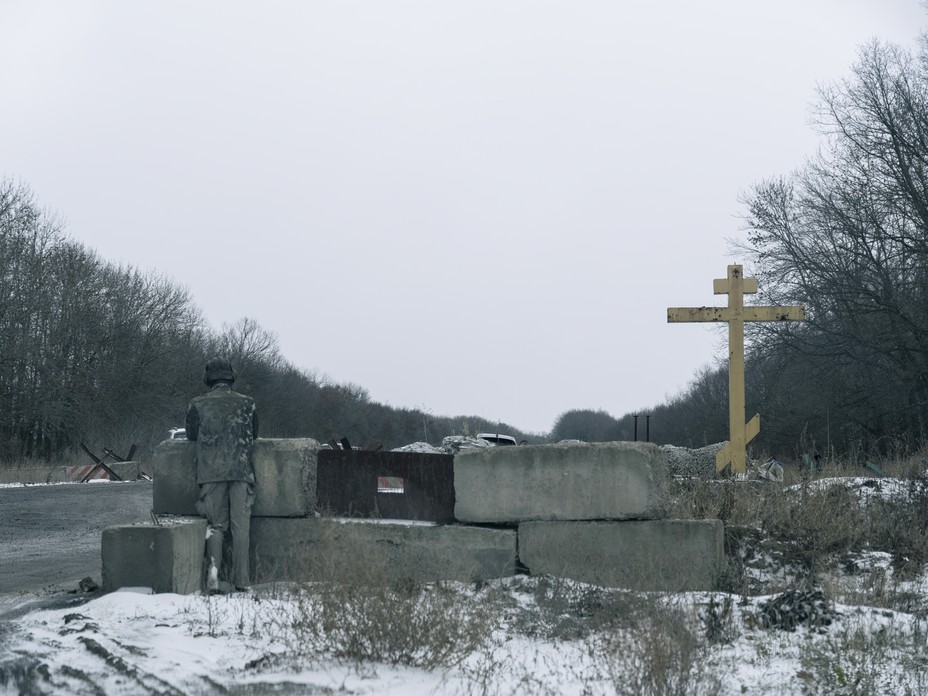Ukraine’s Hardest Winter
16 min read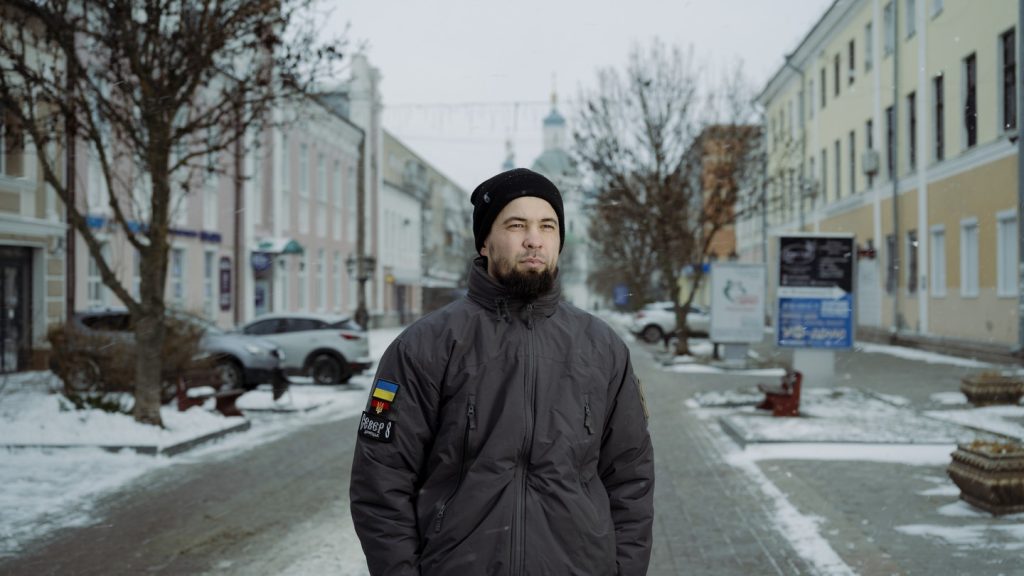
The soldier, a lanky, dark-haired sergeant named Vitalii Ovcharenko, met me at a gas-station café on an otherwise deserted stretch of highway near Sumy, not far from Ukraine’s northern border with Russia. He looked tired. His unit had been fighting in Russia’s Kursk region, where Ukraine captured a swath of territory in August in hopes of trading it for some of the land it had lost in the east.
Ovcharenko first volunteered in 2014, and he has been involved in some of the fiercest battles of the past decade. But when I asked him to name the hardest moment he had faced, his answer surprised me.
“The most difficult time is now,” he said. The past year had been hard enough, with the Biden administration slow-walking the military support it had promised. “Every bullet that doesn’t arrive leads to the death of my friends,” he said. But ever since the election of Donald Trump, “the uncertainty is the hardest part.” The commanding officers said they would fight regardless of the American position. But the soldiers were troubled, because “the American politicians want to do a deal,” he said. “And we know it would not be peace—it would be a tactical pause that would allow the Russians to regroup.”
As if to illustrate his point, a huge explosion lit up the night sky, followed by a loud boom. All the lights went out, even the streetlamps on the highway. The Russians had hit a power station nearby, the latest strike in a continuing effort to destroy Ukraine’s power grid and demoralize the population as winter sets in. Ovcharenko flipped his phone light on and continued talking, as if nothing had happened.
Some of the people I met in Ukraine told me that the country could be facing its toughest winter yet—despite a history that includes some of the worst famine and human carnage of the 20th century. The Russians are pressing forward relentlessly in the east, even though in October alone, more than 1,500 of their soldiers were killed or wounded every day. This fall, Russia fired more than three times as many missiles and explosive drones as it had during the summer months.
Ukraine’s troops are exhausted after nearly three years of warfare. They are heavily outnumbered by the Russians, who have been bolstered by about 10,000 North Korean troops and thousands of mercenaries from other countries, some of them trafficked to the front against their will. Ukrainian civilians are exhausted too, especially now that they face the prospect of more power cuts in a season of bitter cold and darkness.
Ukrainians are watching Trump nominate his Cabinet, scouring each official’s past utterances for hints about future American policies. They can’t do much to influence the encounter that is coming between the Russian and American presidents—both mercurial men, each in the grip of very different delusions about how Ukraine’s war will end. Instead, Ukraine’s soldiers and politicians are taking a hard look at what it would mean to lose American military support, and how they might make up the difference, in a war where victory is being slowly redefined as mere survival.
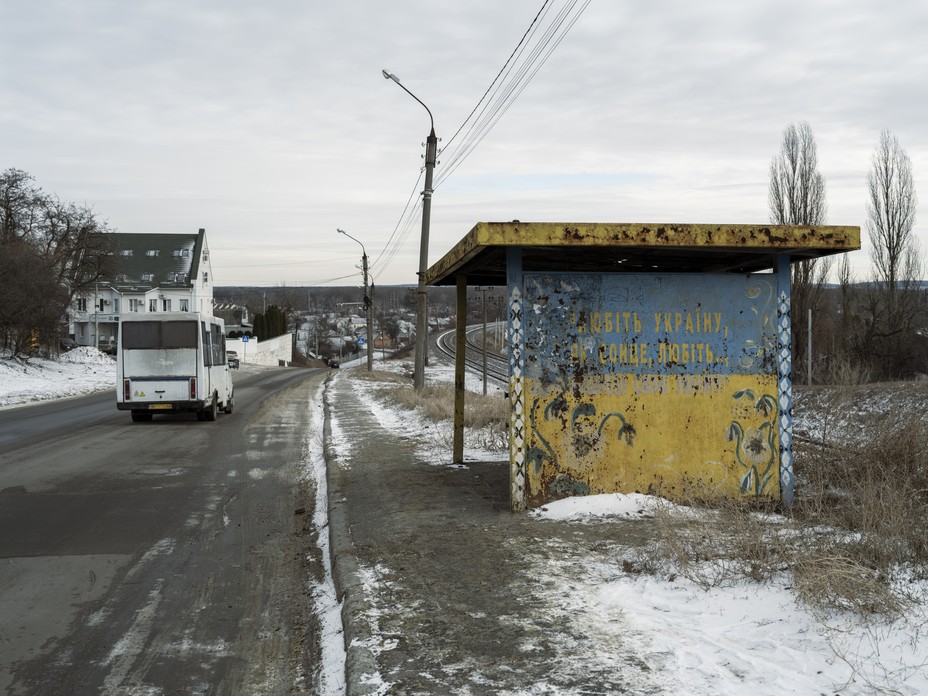
Ukrainians are immensely grateful for the backing they got from the Biden administration after Russia invaded in 2022. At the start of the war, frontline soldiers commonly wore the stars and stripes pinned to their chests. But almost three years later, many have come to see the American arms pipeline as a kind of torture: allowing just enough through to keep up a war of attrition, with no real hope of victory. One member of the Ukrainian Parliament described it to me as “feeding by teaspoons.” A pollster in Kyiv called it a policy of “slow death.” Viktor Yahun, a former Ukrainian intelligence officer, answered my question about how Ukrainians received Trump’s election by reciting a Russian proverb: “Better a horrible end than an endless horror.”
Despite that grim forecast, I heard a surprising degree of fatalistic optimism about Trump among many of the Ukrainians I met. This is partly a measure of their deep frustration with the status quo, and may also reflect the national habit of bravely shrugging off long odds. Against all hope, I hope is a phrase spray-painted on walls throughout Ukraine (it’s a quote from Lesya Ukrainka, a beloved poet from the turn of the 20th century). Everyone knows about Trump’s worrisome promises to reach a quick deal with Vladimir Putin, which would entail a cutoff of American military support. But many people seem confident that Trump’s looming tête-à-tête with the Russian president will work to their advantage by demonstrating the Kremlin’s unreliability as a partner.
“They are incapable of cutting a deal,” Tymofiy Mylovanov, the president of the Kyiv School of Economics, told me of the Russians. “Whenever there’s any symptom of negotiations—let’s say a grain deal, or the Istanbul agreement—they immediately ask for more.” He reminded me that Ukraine has twice made deals with Russia in exchange for security guarantees: first in 1994, when it gave up its nuclear weapons, and again in 2014, when it tried to end the fighting in the Donbas region. Russia violated both agreements. Mylovanov and others told me that they were confident Trump will eventually understand that Putin cannot be trusted, and that he will then take a harder and more realistic line.
In Kyiv, the very mention of the word negotiations elicits a dismissive wave of the hand. Yet this posture may mask a deeper pragmatism. President Volodymyr Zelensky and his aides have maintained that Ukraine will stop fighting only if it is granted NATO membership—a position widely understood to be an opening gambit for talks. (Zelensky’s office declined my requests for an interview; I was told that his administration has adopted a policy of strict discretion in preparation for the transfer of power in Washington.) In the same way, Zelensky’s refusal to cede any territory conceals the reality that many Ukrainians—perhaps most—are ready to accept the loss of the areas Russia now occupies in exchange for a durable peace. Anton Grushetskyi, a Kyiv-based pollster, told me that to say you will accept the loss of Ukrainian territory is still socially unacceptable, which makes people’s real feelings difficult to assess.
Defining a security guarantee will be the crux of any deal. Roman Kostenko, the chair of the Defense and Intelligence Committee in the Ukrainian Parliament and a decorated soldier, told me that a meaningful agreement would require a permanent defense structure along the front line, “so that within hours of a Russian attack, military operations can start. Without that, the security guarantees won’t work.”
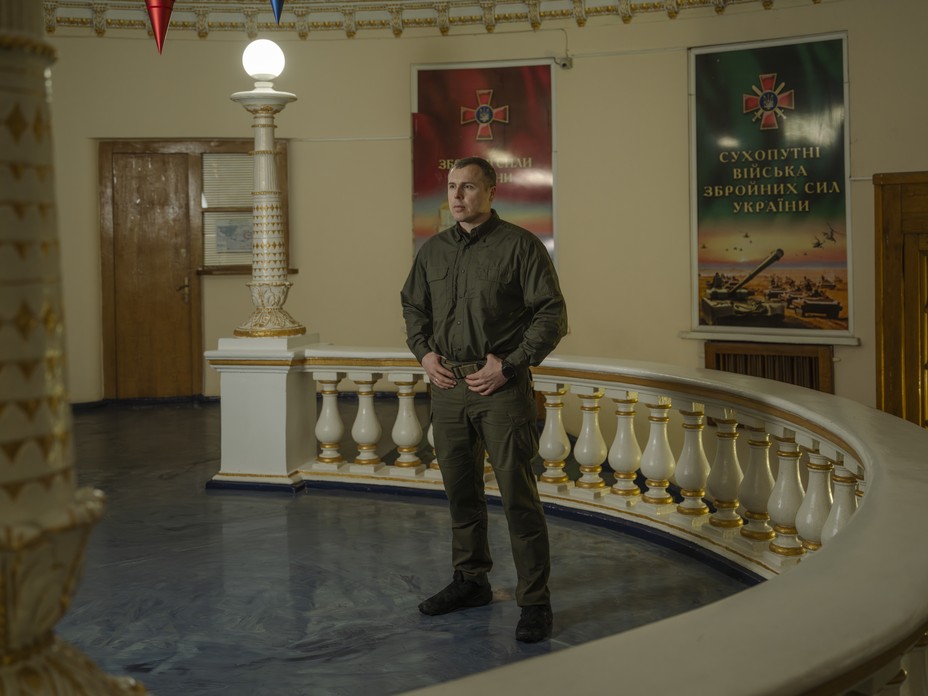
Kostenko did not seem to think a deal of any kind was imminent; he said the Russians were gearing up for an effort to capture the remainder of the Donetsk region by mid-winter. The recent rush of military supplies from the Biden administration following Trump’s election had been helpful, he said. But he added, a little grimly, that if the supplies continued at the current rate, “we may get through the winter” without major losses of territory.
American military hardware has been essential to Ukraine’s self-defense, and the soldiers and volunteers I met recited the most badly needed items like Christmas wish lists. Bradley fighting vehicles, armored against mines and gunfire, are often at the top of the list, as are Abrams tanks and parts to keep them running. Long- and medium-range missiles are seen as essential to striking at the Russian bases that fire on Ukrainian cities. And “you can never have too many drones,” a frontline soldier told me.
One of Ukraine’s most valuable resources is the goodwill of the West, and many people I met seemed acutely conscious that everything could depend on the way their war is framed in Trump’s mind. They plied me so assiduously with reasons for supporting Ukraine that I sometimes had the odd feeling that the whole country was gearing up for a life-and-death audition with an unpredictable boss. Their pitches ranged from simple arguments (“Trump likes success—surely he wouldn’t want Ukraine to fail?”) to more sophisticated ones about the impossibility of separating Ukraine from one of Trump’s top priorities: countering China. The idea here is that China, which has become an indispensable supplier for Russia, would be emboldened if Russia wins, and might go on to challenge American power in the Pacific.
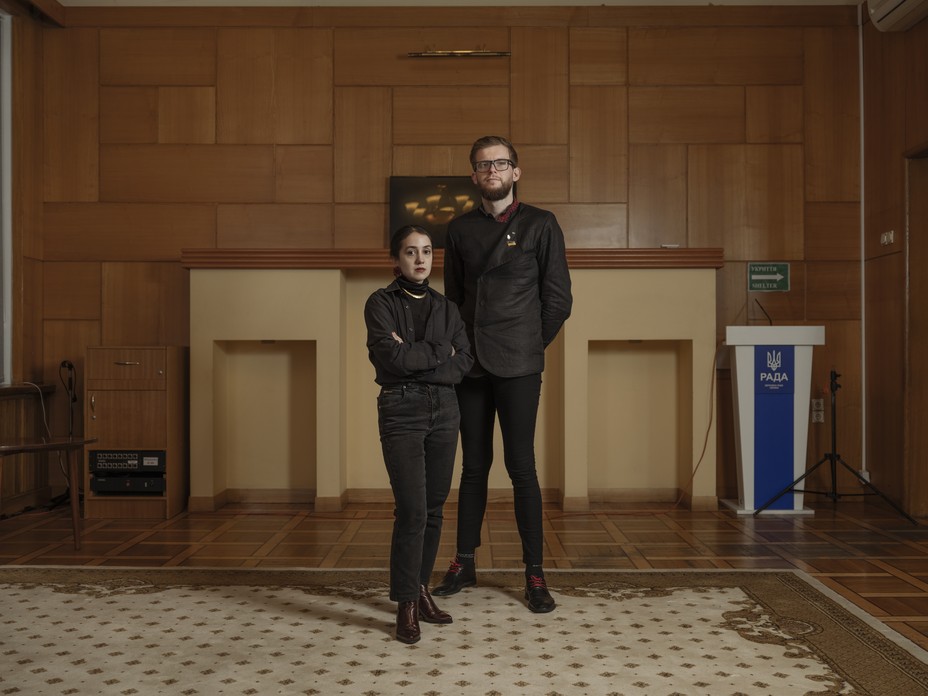
Perhaps the most eloquent spokesperson I encountered was Sviatoslav Yurash, who became the youngest-ever member of Ukraine’s Parliament when he was first elected five years ago, and is now 28 years old. Yurash is tall and very thin, with clunky glasses and thick brown hair swept fully sideways, as if he’d been standing in a gale. When I met him in a Kyiv café, he had just returned from the front line, where he mans a Browning M2 machine gun when Parliament is not in session. “Mr. Putin is very clear—he sees us the way Hitler called the Swiss: renegade Germans,” he told me. Yurash likened Putin’s Russia to “a big icebreaker that is destroying the international order,” adding that the ultimate beneficiary will be China.
Yurash told me he’d been in touch with Americans across the political spectrum in his effort to promote the Ukrainian cause. He mentioned Tucker Carlson, who interviewed him early in the war, and Jordan Peterson’s daughter, who spoke with him for a documentary she was making. “I’ve met people who organized prayer breakfasts,” Yurash said with an amused grin. He seemed intensely curious about America’s tribal divisions but a little baffled by what he’d encountered, both on the left and the right. At one point his assistant, Kateryna Doroshyna, held up her phone with a puzzled expression and showed me a social-media post that read, in English: “How can I show Ukrainians that they benefit from white privilege?”
I wasn’t sure how to begin explaining that to someone who regularly risks her life delivering supplies to soldiers on the front line. But both of them shrugged and laughed it off. “We just need to tell our story,” Yurash said. “For us, the idea that Trump could persuade the Europeans to do more is quite welcome.”
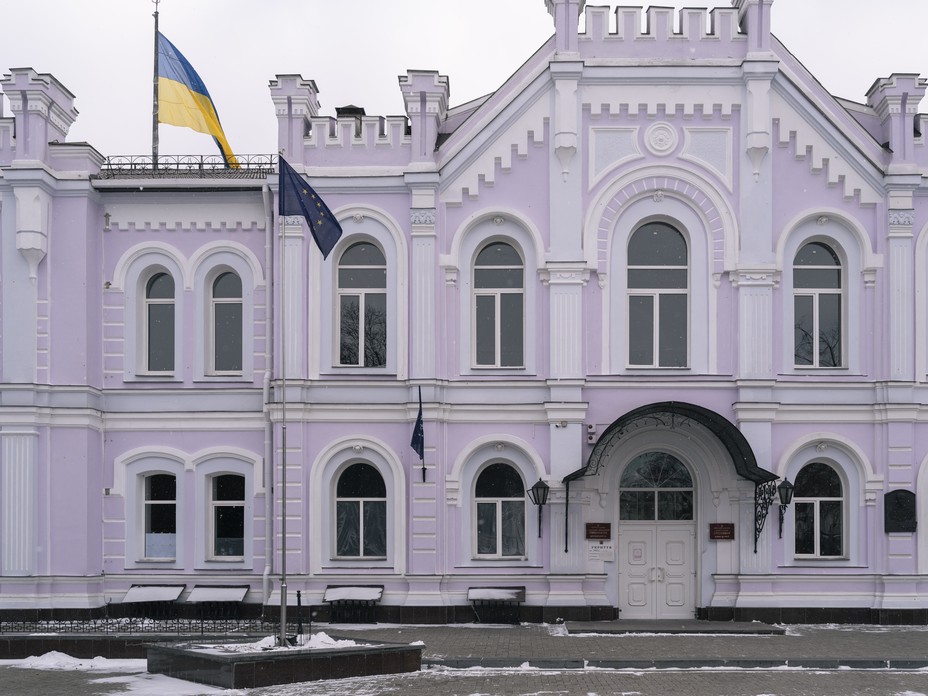
Unlike Trump, many European leaders see Russia’s war in Ukraine as a threat to their own safety and have acted accordingly. The Baltic states have given their entire stock of some weapons types to Ukraine. One Polish official told me that his country—which has provided more tanks to Ukraine than any other in Europe—has no more to give now, “because we are next on the front line.” Tomas Kopecny, the Czech envoy for Ukraine reconstruction, told me that Czech factories had increased their production of large-caliber ammunition elevenfold in the first two years of the war. Kopecny also leads the Czech Ammunition Initiative, which acts as a broker for states with ammunition to sell, including some that would not be willing to sell directly to Ukraine out of fear of angering Russia. The Czech initiative has delivered about 500,000 rounds of 155-millimeter artillery to Ukraine in 2024, Kopecny said, and will deliver more next year.
And yet, even if the Europeans were to give everything they have, they could not supply enough matériel to compensate for an American cutoff. Ukraine will need a prolific weapons industry of its own. As it happens, some of the rudiments are already in place, because Ukraine was an engine of the Soviet Union’s military industry during the Cold War, with 750 factories. After the wall fell, Kyiv transferred much of its arsenal to Russia, and some of those weapons are now being used against it. Some friendly states have begun injecting money into Ukraine’s domestic arms plants. Denmark, Norway, and Sweden have collectively allocated about $680 million to Ukrainian defense production so far, including money from the interest on Russian financial assets frozen in Europe.
Sooner or later, some Ukrainians say, the country will have to rely entirely on its own resources. Trump may just be hastening that day. One Ukrainian who thinks this way is Maria Berlinska, a driven 36-year-old from western Ukraine and a prominent figure in the domestic drone industry. One Ukrainian general labeled her the “mother of drones” last year.
Berlinska met me in her Kyiv office, an atticlike space with the flags of various military units pinned to the walls and ceiling. She’d been getting a graduate degree in Jewish history when the 2014 revolution started, and later that year she joined the army on a volunteer basis. She spent much of the following three years on the front lines in the east, teaching soldiers how to fly drones and integrate them with other military technologies. She also lobbied politicians to support the industry.
“My message was very simple: Sooner or later, Russia will return,” she told me. “We should invest in technology, because we can’t rely only on Western countries.” She always brought a sample drone with her, explaining to ministers and lawmakers that it could be a dangerous weapon not just against enemy soldiers but against tanks and armored vehicles as well.
“They were laughing,” she told me. “They said it’s just toys.”
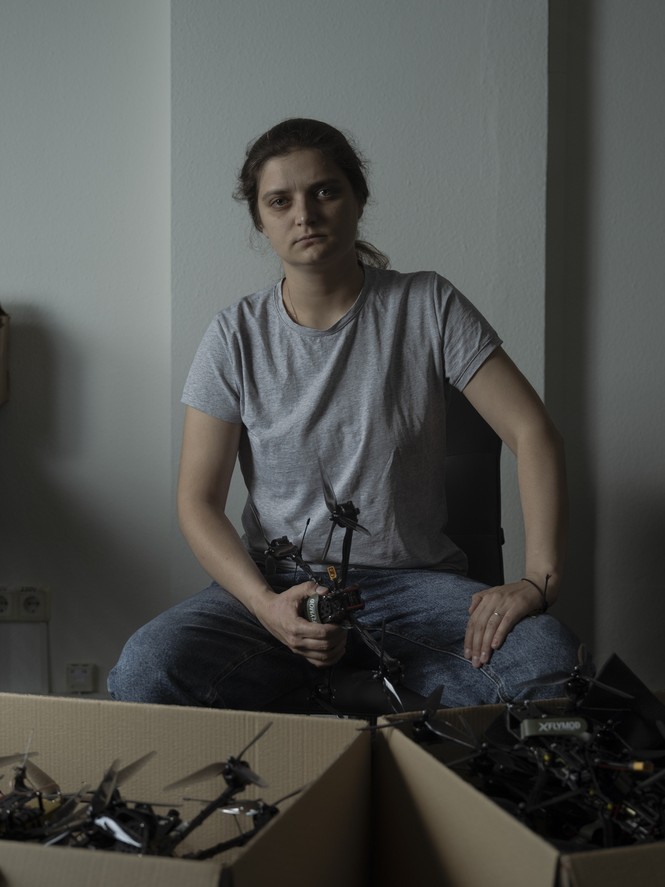
They are not laughing anymore. Ukraine now has at least 100 active drone companies in different stages of production, says Kateryna Bezsudna, a co-founder of a nonprofit, called Defence Builder, that assists start-ups in Ukraine’s defense sector. Bezsudna told me that Ukraine has become a testing ground for new drone technologies that it could eventually export abroad. At a dinner party in Kyiv, I met a couple who work for a new firm called Hard Cat Drones, which makes marine drones specifically designed to destroy enemy drones, boats, and mines—a useful weapon on the Black Sea, where Ukraine has had some remarkable successes in beating back the Russian navy.
Berlinska has no illusions about what drones can and cannot achieve. Her highest priority now, she told me, is an ambitious effort to compensate for Ukraine’s personnel shortages by training civilians to help build and deploy drones and other kinds of defense technology, a project she calls the “technological militarization of society.”
That phrase gave me pause. It sounded more like North Korea than the vibrant democracy Ukraine hopes to maintain. Berlinska conceded the point. “I would like to be wrong in my predictions,” she said. But with the prospect of losing American support, Ukrainians need to get used to the idea of being citizen-soldiers. She was one of several people in Kyiv who invoked Israel—with its mandatory conscription for men and women—as a model.
Ukraine’s survival may depend as much on strength of will as on weapons. The spirit of national unity on display in 2022, when so many citizens took part in their country’s defense, is being tested as fissures widen between those fighting the war and the rest of society. There is a greater reluctance to serve, and I heard stories in Kyiv about young men who stay off the streets during the day because they fear being forcibly conscripted. Ovcharenko, the soldier I met in Sumy, made clear that he had questions about “some parts of society” that were not pulling their weight.
Russian hackers and trolls work constantly to exacerbate these divisions, largely through social media. “We can see that the enemy is doing massive psyops,” Kostenko, the Parliament member, told me. “They try to discredit the military and the institutions.” Real frustrations can be hard to distinguish from propaganda that plays on them. Not long ago, Ovcharenko told me, he was evacuating a wounded soldier in a car, driving very fast. “Usually other drivers understand,” he said. “But there was a video online accusing the military of abusing its privileges, that they’re reckless and drive drunk.” He couldn’t help wondering what the civilians on the roadside were thinking as he went past.
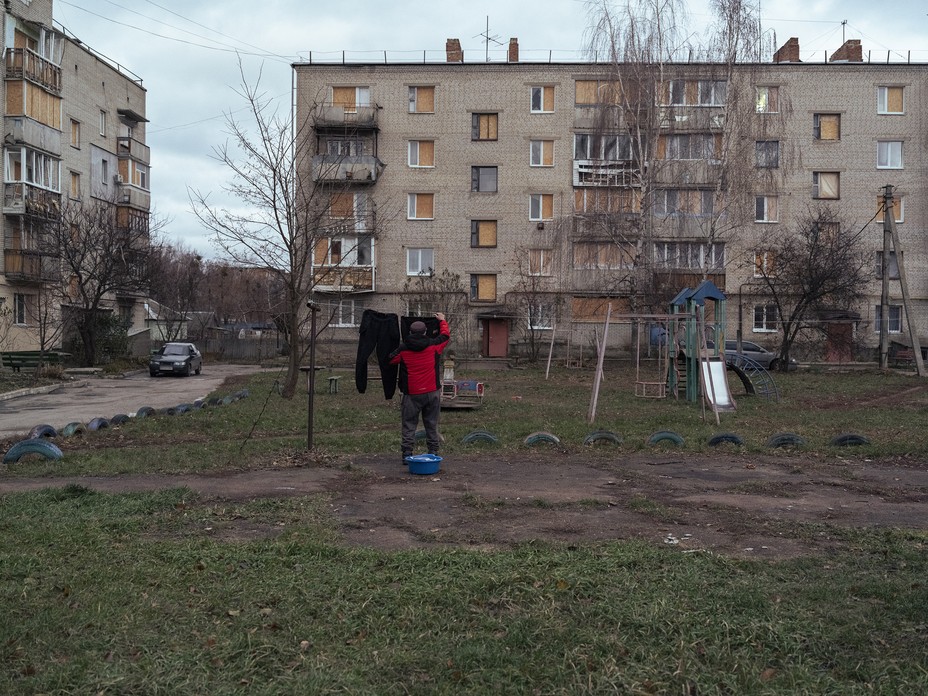
Ukrainians know that any deal worked out by Trump and Putin is likely to be a respite rather than a resolution, and that knowledge carries its own psychic burden. A 31-year-old woman told me that she was dreading the uncertainty of a cease-fire. “When the war is happening every day, you’re used to it,” she said. “But I feel anxious knowing that when it stops, we will just be waiting and worrying until it starts again.” Others told me they feared that the adrenaline rush of war would give way to depression as the nation faced the scale of its destruction. The World Bank has estimated the cost of rebuilding Ukraine at $486 billion. And many refugees may be reluctant to return to their home in a cease-fire. “There is no trust,” Grusketshyi, the pollster, told me. “What if Russia attacks two years later? People will say, ‘Why live in a frontline city?’ Mariupol was rebuilt after 2015,” when the Russians first destroyed it. “Then it was destroyed again in two months.”
The greatest fear for Ukrainians is a true collapse. This could play out in a number of ways. Mylovanov, at the Kyiv School of Economics, told me that a Russian victory would surely send enormous numbers of refugees across Ukraine’s western border. Poland and other border states would “arm themselves to the teeth,” he said, and Ukraine itself might devolve into a patchwork of armed uprisings.
In Sumy, the city I visited near the Russian border, I met a number of Ukrainians who were preparing themselves for the worst-case scenario. Sumy had been encircled by the Russian military for two months after the 2022 invasion, and that period was a crucible for the city’s people. The Ukrainian military and local authorities all withdrew, leaving citizens to fend for themselves. They quickly organized themselves into civilian militias, one resident told me, “collecting money and food and bottles for Molotov cocktails.” In the end, the Russians withdrew without a direct assault on the city.
I saw a small example of the city’s resilience the day after I arrived. A Russian missile had struck the courtyard of a large housing complex, killing 11 people, including children, and injuring scores of others. When I got there, about 12 hours later, debris and shattered glass littered the area, and the missile had left a deep crater. The police and emergency services were there—but so were hundreds of local people, sawing boards to patch up broken windows, offering food and tea, and consoling the victims’ families. One woman told me that immediately after the strike the night before, groups of young volunteers had gone straight to the site to help out.
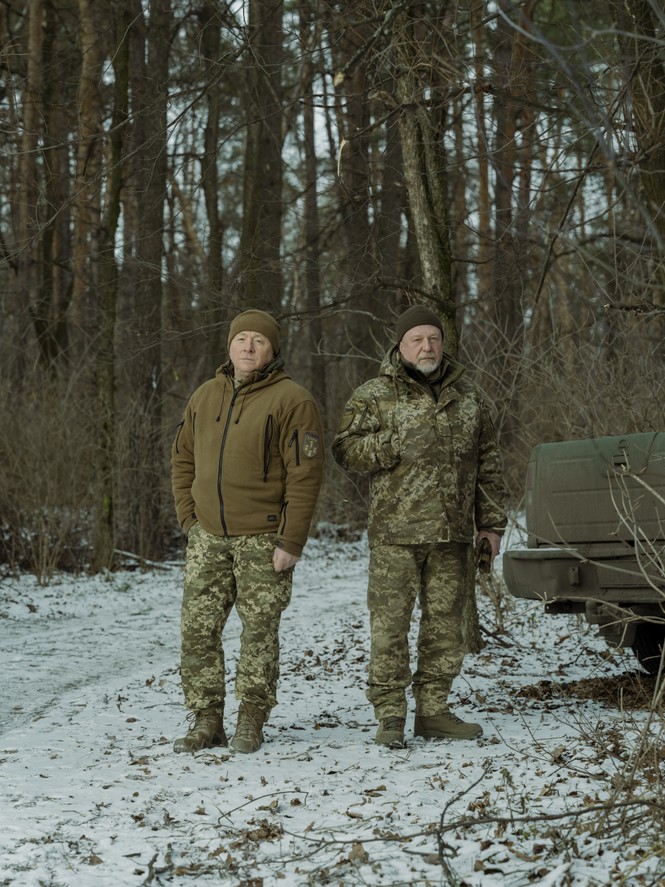
The man who drove me there was a 59-year-old local named Yuri Shvydkyi, who had lost a close friend in the bombing. He used to run a travel-goods store but had transformed it into a military outfitter. Shvydkyi told me that when the Russians invaded in 2022, he withdrew cash, got in his car, and drove his daughter and her children to relative safety in Kyiv. Then he turned around and drove back to Sumy to rejoin his wife, passing through Ukrainian and Russian checkpoints on the way. He described the return journey as “like TheMetamorphosis—you feel you are slowly turning into an insect.” He was lucky to survive it; many Ukrainian civilians were shot and killed on that road.
Now he spends much of his time as a paramilitary defender at a guard post on the outskirts of town. From there, he and some other men shoot at the Russian drones that fly over the border. The city hasn’t compensated them for months, but they man their posts 24 hours a day anyway, Shvydkyi told me, “filling in the gaps where the army is not,” because “I know the Shahed drones are targeting my granddaughter.”
One evening, Shvydkyi invited me and my translator to join him at the home of some of his friends. The power was out, so we climbed the stairs to their 10th-floor apartment in the dark, using our phones to light the way. Our host, a ruddy-faced man named Anatoly Snihiriov, had retired from army service at the age of 60 a few months earlier. He and his wife prepared an eclectic meal in the dark—cheese, sausage, mango-flavored cake, tea, cognac. Snihiriov showed me a framed photograph on the wall of him with his infantry unit, taken last year: a dozen or so men standing with autumn foliage behind them. “This guy was killed by a sniper,” he said. “This guy was killed by a mine. This guy is a prisoner of war. This guy is maimed on his whole right side.”
The conversation over the next two hours was an odd blend of apocalyptic and cheerful. Snihiriov and his wife, who had also served in the military, talked about the proper use of tourniquets; both of them knew people who had lost limbs because the dressings hadn’t been applied properly. They argued about which is worse, to die instantly in battle or to survive with debilitating injuries that leave you unable to care for yourself. When I asked about the future of their city, they said they expected all but the smallest businesses to fail or move away, because of the constant threat of Russian drones and glide bombs. “You need to be small enough that the Russians can’t find you or they think it’s not worth it,” Snihiriov said.
At one point, Snihiriov mentioned that they kept assault rifles in their home. “When you live in a border area, you have to be prepared,” he said.
Later, after saying goodbye and emerging into the frigid darkness, I found myself thinking about the painful uncertainty that these people faced, with their homes so close to the front lines of what looks more and more like a global war.
“We are grateful to the American people that we could win so far against Russia,” Snihiriov told me before I left. “Now we feel a bit betrayed. But we will keep fighting to the end.”
